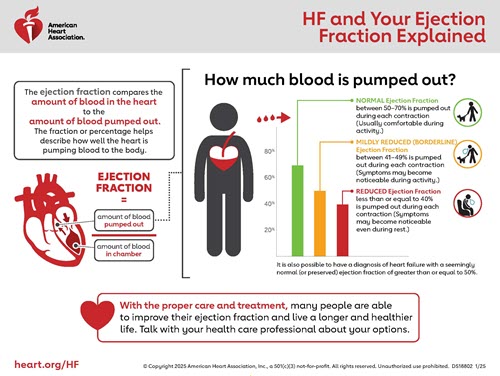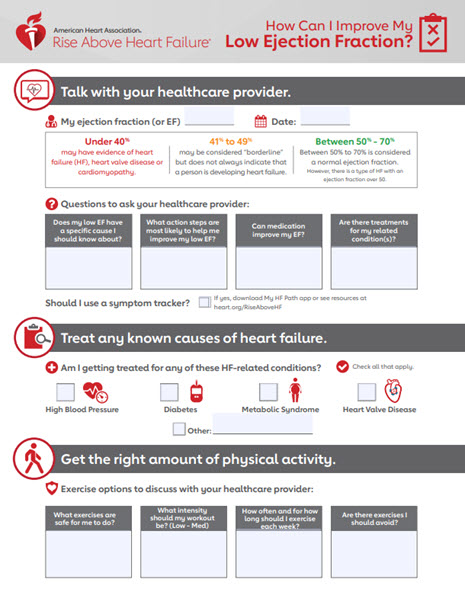Storytelling thru Content, Photos, Videos, and Icons
Good news! Many people with a low ejection fraction (or EF) have successfully improved it.
Better heart failure management can lead to a better ejection fraction. By managing your heart failure carefully and following your treatment plan, you might have fewer symptoms and achieve a greater sense of well-being. As an added bonus, you could also see an improvement – or even a recovery – of your heart’s ejection fraction.
People with improved or recovered ejection fractions, as a whole, tend to have fewer hospitalizations and better overall results.
Download a printable version of this information (PDF).
1.  Talk with your health care professional about improving your EF.
Talk with your health care professional about improving your EF.
Your health care professional can help you draft a realistic plan that’s right for you. Ask your health care professional for their recommendations and accept the encouragement and support of family members or friends who can help you reach your goals.
Before you decide on your next steps, first discuss the following questions with your health care professional:
- What is my EF?
- Why is my EF low and how does it affect my health?
- Which lifestyle changes or medications are likely to help me? Is there anything I should avoid?
- If I track my heart failure symptoms, how might that help improve my outcome?
- When should I plan to retest my EF?
2.  Treat any known causes of heart failure.
Treat any known causes of heart failure.
Find out if your HF is clearly linked to an underlying cause. Several risk factors are associated with heart failure, such as high blood pressure, or hypertension, diabetes and metabolic syndrome. By managing those conditions, you might be able to improve your heart failure and your ejection fraction.
Know your plan and follow it carefully. If you have been prescribed medications for heart failure, diabetes, high blood pressure or another underlying cause, taking your prescribed medication may also improve your ejection fraction. Over time, as the medications are working, your heart might be able to recover, strengthen and perform better.
3.  Get the right amount of physical activity.
Get the right amount of physical activity.
Physical activity helps most people with HF, and some patients who follow an exercise plan see improvements in their EF. Research shows that being active can help people living with heart failure by reducing symptoms, improving mood and even increasing the heart’s ability to pump blood. If your heart failure is stable, and you have your doctor’s OK, do what moves you.
Here are some exercise tips to keep in mind.
- Consider a cardiac rehab program. It offers some unique benefits, and you might even be able to join a supervised home-based exercise program. Talk to your health care professional to see if you qualify. Explore our cardiac rehab resources.
- Work toward 20-30 minutes of cardio. Most HF exercise programs focus on improving your ability to sustain aerobic activity.
- Explore strength training. Studies show that some people living with HF benefit from resistance or weight training, which also can contribute to an improved EF. Be sure to talk with your health care professional before starting and go easy on yourself at first.
- Start with walking. If you’re just getting started, walking is a good and safe way to begin. It’s easy to do, and it might help you learn to pace yourself. Your health care professional might do a 6-minute walk test to help measure your improvements over time. You simply start by seeing how far you can walk in one 6-minute session.
- Begin and end with a warm-up and cool-down. If you use a fitness tracker or heart rate monitor, you could benefit from setting heart rate zones with your health care professional. A brief warm-up and cool down can help your body transition smoothly in and out of your exercise zone and reduce symptoms of dizziness and/or lightheadedness.
4.  Pay attention to your weight.
Pay attention to your weight.
Your weight is important. Tracking your weight can give you important clues about how well your heart is managing its load.
- Track and respond to weight fluctuations. You might notice patterns that help you respond appropriately to situations before they get worse.
- Maintain a healthy body weight. A healthy body mass makes it easier for your heart and blood vessels to circulate blood and manage fluid levels.
5.  Know your sodium limits and regulate fluids.
Know your sodium limits and regulate fluids.
- Check your sodium intake. The average American consumes about 3,400 milligrams of sodium per day, which can result in the body holding excess fluids and create an added strain on the heart.
- Follow your sodium recommendations. For most patients with heart failure, the AHA recommendations of no more than 1,500 milligrams of sodium per day are appropriate, but your treatment plan may have an alternate recommendation. Read labels and follow your treatment plan carefully.
- Discover ways to help you reduce sodium in your eating style.
6.  Eliminate harmful substances.
Eliminate harmful substances.
- Abstain from alcohol. Alcohol can increase the risk of heart failure and worsen symptoms. By eliminating alcohol, the signs and symptoms of heart failure often improve.
- Quit smoking. Smoking cigarettes is especially hazardous to people with heart failure. Discover the resources that can help you quit for good.
- Quit any usage of cocaine or amphetamines. These substances are strongly associated with HF and should be eliminated to improve your chances for a recovered EF. Do not stop taking any prescribed medications without discussing with your health care professional.
7.  Lower your stress.
Lower your stress.
- Care for your emotional well-being. Although the correlations between heart failure and stress are unclear, being stressed can increase heart rate and blood pressure, two things that can worsen heart failure symptoms.
- Practice stress-reducing habits. Although we cannot always control what happens to us, we can practice skills for lowering stress. Whether or not stress-reduction has a direct effect on your ejection fraction, it never hurts to develop tools for emotional well-being. Read some quick tips for lowering stress or visit our Support Network to connect with others.
What results can I expect?
Although individual results can vary, the efforts you put into improving your heart’s ejection fraction can have additional positive results. You might also discover that you feel better and experience fewer symptoms as well. The investment you are making to help yourself recover is your best pathway for taking control of your health.
Connect with others on our Support Network where people are encouraging each other every day to achieve their best health.

Download our sheet: HF and Your Ejection Fraction Explained (PDF) | Spanish (PDF)






